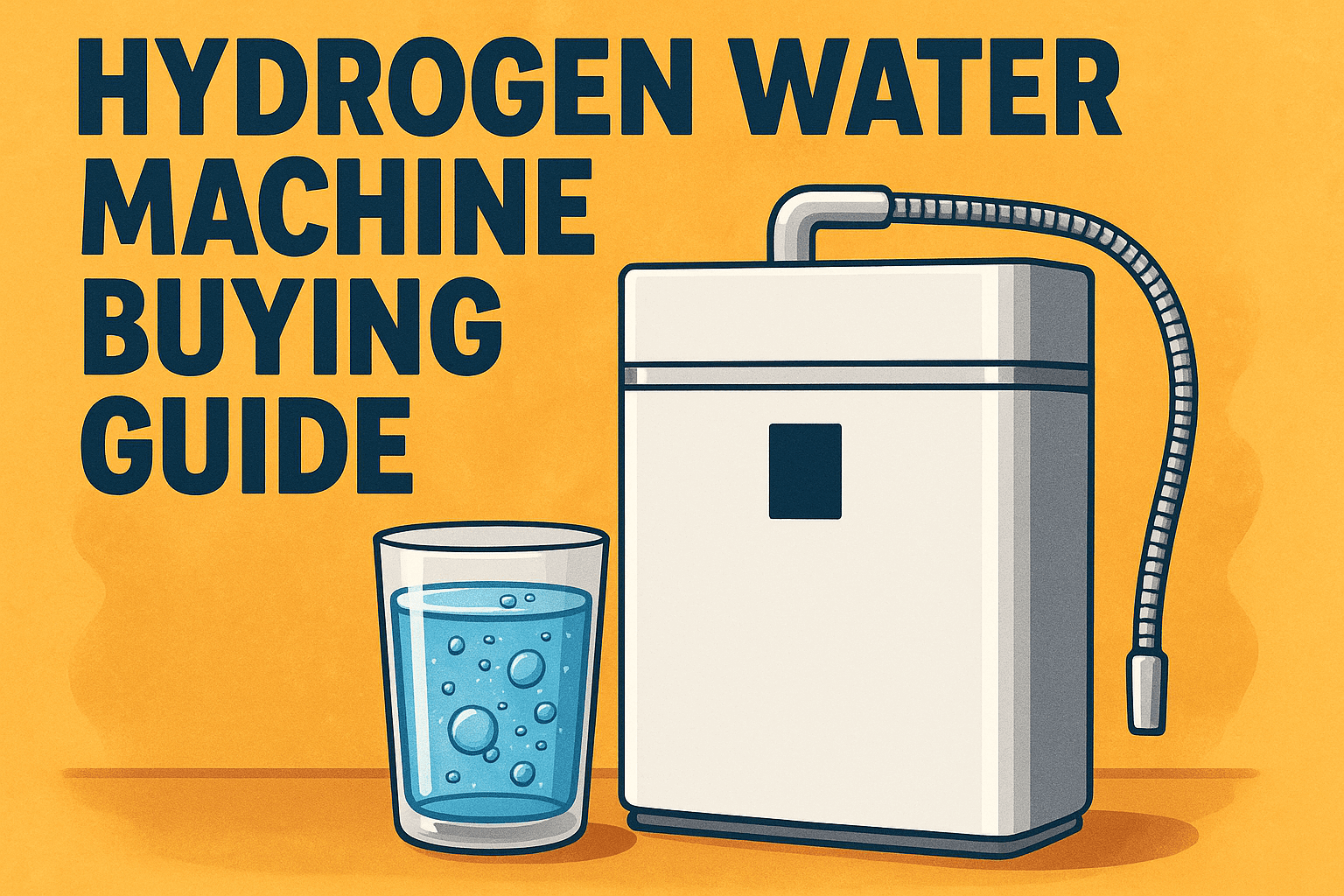
Best Hydrogen Water Machines: What to Look For (Practical Buyer’s Guide)
Cut through the noise—learn the specs that actually matter (ppm, capacity, PEM tech, filtration), plus a quick machine compare.
Hydrogen water machines add molecular hydrogen gas to regular drinking water through a process called electrolysis. These devices have gained popularity as people look for ways to improve their daily hydration routine.
The machines come in different styles, from countertop units to portable bottles.

The best hydrogen water machine for your needs depends on factors like hydrogen concentration levels, water capacity, filtration features, and your budget. Some machines produce over 1,300 parts per billion of hydrogen, while others focus on portability for travel use.
Price ranges vary widely based on these features and build quality. Shopping for a hydrogen water machine can feel overwhelming with so many options available.
Understanding the key differences between models will help you make a smart choice. This guide breaks down what matters most when comparing hydrogen water machines.
Key Takeaways
- Hydrogen water machines use electrolysis to infuse regular water with molecular hydrogen gas.
- The right pick depends on ppm output, capacity, filtration, and budget—aim for roughly 0.8–1.6 ppm for everyday use.
- PEM/SPE tech helps ensure clean H₂ (no chlorine/ozone) and consistent performance.
New to H₂? Start with the Hydrogen Water: Ultimate Guide or the Machine Buying Guide.
Key Considerations for Buying a Hydrogen Water Machine

Choosing the right hydrogen water machine depends on several critical factors including hydrogen concentration output, machine type, electrolysis technology, and practical features like capacity and portability.
Understanding these elements helps you select a device that matches your specific needs and budget.
Understanding Hydrogen Concentration (ppm)
Hydrogen concentration indicates how much H₂ dissolves into water. Most quality machines output roughly 0.5–1.6 ppm. Higher isn’t always better—consistency and freshness matter.
- Basic use: 0.5–0.8 ppm
- Regular consumption: 0.8–1.2 ppm
- Maximum benefit: 1.2–1.6 ppm
Look for devices that maintain output over time (good electrodes, proper maintenance). Prefer models with measured ppm, not vague claims. See retention tips: How long H₂ stays in water and How to store hydrogen water.
Types of Hydrogen Water Machines
Hydrogen water bottles are portable (12–16 oz), creating H₂ in about 3–10 minutes.
Hydrogen water pitchers process 1–2 L in ~10–30 minutes—good for family pours.
Countertop / under-sink generators connect to a water source for higher daily volume, often with integrated filtration.
Portable generators are the flexible “everywhere” option; permanent systems are best for households needing steady capacity. Compare: Bottles vs. Machines.
Electrolysis Technology & PEM Features
SPE/PEM (solid polymer electrolyte / proton exchange membrane) is the gold standard—separates hydrogen from oxygen and avoids byproducts like chlorine/ozone.
- Platinum-coated titanium electrodes: durability + consistent ppm
- Self-cleaning cycles: reduces scale and keeps output stable
- Pressure-assisted design: improves H₂ dissolution
Budget devices without PEM may have more upkeep and less consistent performance. Deep dive: How hydrogen water is made.
Materials, Capacity & Portability
- Borosilicate glass for taste neutrality and H₂ retention
- BPA-free plastics for light weight
- Stainless steel for durability (design-dependent on retention)
Capacity: single users often do well with 12–20 oz bottles; families benefit from 1–2 L pitchers or plumbed systems. If you travel or work on the go, battery life, charge options, and weight all matter. See also: Echo machine review.
Quick Compare: Popular Machines
High-level overview—tap a model for details and current pricing.
| Model | Type | Best for |
|---|---|---|
| Echo H2® | Countertop | Most households (daily H₂) |
| Echo Flow | Under-sink | On-demand at the tap |
| Echo Ultimate™ Editor’s Pick | Countertop/Under-sink | Premium, heavy use |
Prefer portable? See Echo Go™ or browse all portable options.
Health Benefits & Practical Uses of Hydrogen Water
Hydrogen-enriched water shows potential for antioxidant benefits and reducing oxidative stress. Early findings suggest support for hydration, recovery, and overall wellness.
Hydration & Antioxidant Properties
Hydrogen acts as a selective antioxidant and diffuses rapidly. See also: Using H₂ for max benefits.
Cognitive & Cardiovascular
Research is ongoing; preliminary studies point to oxidative stress reduction and potential support for endothelial function. For broader context, see Brain benefits and Inflammation.
Recovery & Active Lifestyles
Many athletes use H₂ for recovery and performance support. Explore: Athletes & performance and Recovery guide.
Skin & Anti-Aging
Early work suggests potential on hydration/elasticity—read more at Skin benefits and Anti-aging.
Frequently Asked Questions
Buyers usually ask about key purchase factors, performance differences, maintenance, benefits, pricing, and lifespan.

